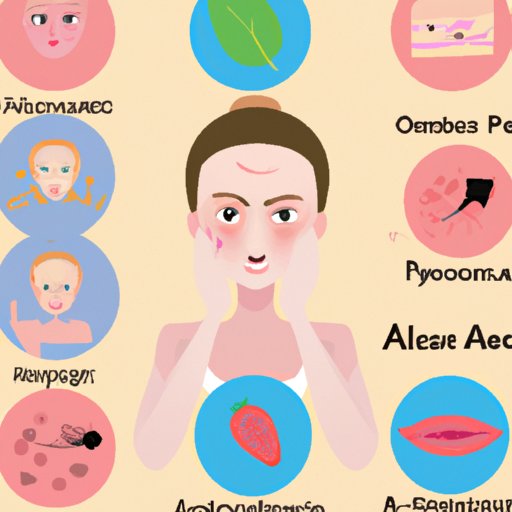Introduction
Acne is a common skin condition that affects people of all ages. It can appear on the face, chest, back, shoulders, or other parts of the body, and may range from mild to severe in intensity. The condition is characterized by redness, swelling, and pimples filled with pus. While most people associate acne with puberty, it can occur at any age and can be caused by a variety of factors.

Examining the Role of Bacteria in Acne Formation
One of the primary causes of acne is bacteria. Propionibacterium acnes (P. acnes) is a type of bacteria that naturally occurs on the surface of the skin. When these bacteria become trapped in the hair follicles, they can cause inflammation and lead to acne breakouts. In some cases, the overgrowth of P. acnes can be caused by an imbalance of oil and bacteria on the skin.
When P. acnes bacteria enter the pores, they feed on sebum (the natural oils produced by the skin). This process produces toxins that can irritate the surrounding skin tissue, leading to inflammation and the development of acne lesions. Bacterial infection can also worsen existing acne, as the body’s immune system responds to the presence of the bacteria by producing more oil and increasing inflammation.
Exploring the Link Between Diet and Acne
Certain foods have been linked to increased levels of acne. Greasy foods, such as fried chicken, french fries, and burgers, can lead to excess oil production and clogged pores, which can contribute to the development of acne. Dairy products, such as milk, cheese, and yogurt, contain hormones that can stimulate oil production and increase inflammation. High sugar intake can also trigger an increase in insulin levels, which can cause the body to produce more testosterone, further aggravating acne symptoms.
Understanding the Impact of Stress on Acne Breakouts
Stress can also play a role in the development of acne. When we experience stress, our bodies release hormones known as cortisol and adrenaline, which can trigger an increase in oil production and inflammation. Additionally, stress can weaken the immune system, making it harder for the body to fight off bacterial infections. As a result, those who are prone to stress-related breakouts may find that their acne worsens during times of high stress.

Investigating the Correlation Between Hormonal Changes and Acne
Hormonal changes can also lead to acne outbreaks. During puberty, hormonal fluctuations can cause the body to produce more oil than usual, leading to clogged pores and acne. Women may experience periodic breakouts around the time of their menstrual cycle due to hormone fluctuations. Other hormonal conditions, such as polycystic ovary syndrome (PCOS), can also cause acne.

Analyzing the Relationship Between Genetics and Acne
Genetics can also play a role in the development of acne. Those with a family history of the condition are more likely to develop acne, as certain genetic factors can increase the risk. Additionally, certain genes have been found to influence the severity of acne. For example, the HERC2 gene has been linked to the production of sebum, which can lead to clogged pores and breakouts.
Assessing the Influence of Skincare Products on Acne Development
The use of certain skincare products can also exacerbate acne symptoms. Many products contain harsh ingredients, such as alcohol, that can strip the skin of its natural oils and disrupt the balance of bacteria on the surface. Additionally, some products contain pore-clogging ingredients, such as mineral oil, that can lead to breakouts. Natural skincare products, such as those containing tea tree oil, can help keep skin clear and reduce inflammation.
Conclusion
Acne is a common skin condition that can be caused by a variety of factors, including bacteria, diet, stress, hormones, and genetics. Identifying the underlying cause of your acne is key to finding the right treatment. In addition to medical treatments, such as topical creams and oral medications, lifestyle modifications, such as reducing stress levels and avoiding certain foods, can help reduce acne breakouts. Natural skincare products can also be beneficial, as they can help maintain the balance of oil and bacteria on the skin.


